Welcome to our comprehensive Syrian Hamster Care Guide! If you’re a proud owner or considering getting a pet hamster, this guide is here to help you provide the best care and support for your beloved furry friend. Syrian hamsters are popular pets for families, including beginners and children, as they are friendly, low-maintenance, and full of personality. Let’s dive into the essential tips to ensure your Syrian hamster’s happiness and well-being.
Nuggets Of Wisdom:
Handling Your Hamster
Properly socializing your hamster and allowing them time to adjust to their surroundings is crucial. Hamsters can be squirmy, so it’s important to handle them with care.
| Handling Tips | Hamster Behavior |
|---|---|
| Gently hold your hamster over a soft surface, such as a pillow or blanket, to avoid any accidental falls. | Hamsters rely on their senses of smell and touch to explore their environment. |
| Avoid squeezing them too tightly or grabbing them by their tails, as this can cause them discomfort or injury. | Hamsters have cheek pouches to store food, which they may use to surprise you with sudden treats! |
| Take your time to build trust with your hamster by offering them tasty treats and speaking to them in a calm, soothing voice. | With patience and consistent handling, your hamster will become more comfortable and less likely to nip or bite. |
Hamsters can also be trained to use a litter box. By placing a small litter box in their habitat, you can teach them to eliminate in a designated area, making cage cleaning easier for you.
Remember to always supervise any interactions between your hamster and children, as hamsters are delicate creatures that require gentle handling. By following these tips, you can ensure a positive and safe handling experience for both you and your furry friend.
Stay tuned for the next section, where we will explore the fascinating characteristics of Syrian hamsters.
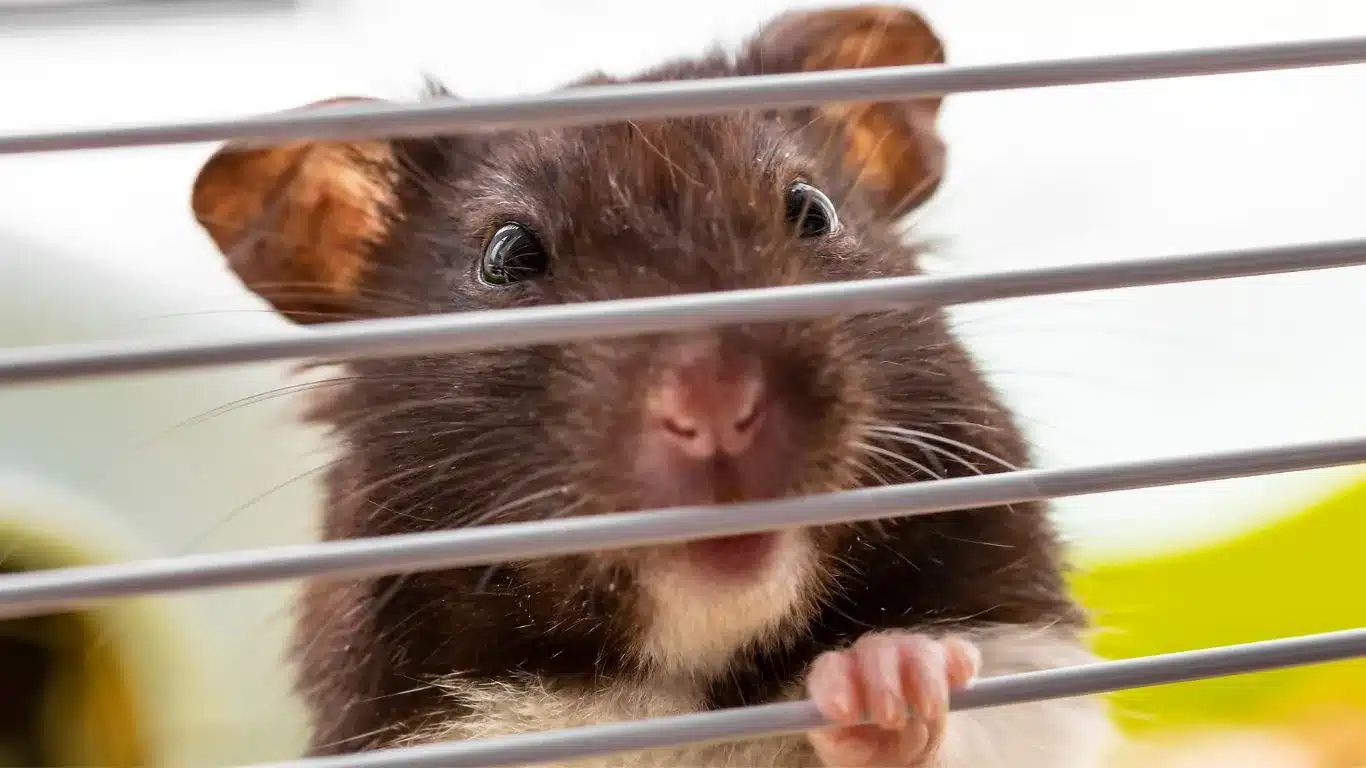
Characteristics of Syrian Hamsters
Syrian hamsters, also known as golden hamsters, are fascinating and delightful pets. They possess unique traits and characteristics that make them a popular choice among hamster enthusiasts. Understanding the specific attributes of Syrian hamsters is crucial for providing them with the care they need to thrive.
Lifespan and Size
Syrian hamsters have an average lifespan of 2-3 years when given proper care and a healthy lifestyle. These adorable creatures typically grow to be around 5-7 inches long, making them a compact yet charming addition to any household.
Omnivorous Nature
One intriguing aspect of Syrian hamsters is their omnivorous diet. They enjoy a diverse range of foods, including seeds, fruits, vegetables, and even small insects. This aspect of their nature allows for a versatile and balanced diet that promotes their overall well-being.
Minimum Habitat Size
To ensure the health and happiness of your Syrian hamster, it’s imperative to provide them with a spacious and comfortable habitat. The minimum recommended size for their habitat is 24″L x 12″W x 16″H. A larger habitat allows them to engage in natural behaviors such as running, burrowing, and exploring their surroundings.
| Characteristic | Details |
|---|---|
| Lifespan | 2-3 years |
| Size | 5-7 inches long |
| Diet | Omnivorous – Seeds, fruits, vegetables, insects |
| Habitat Size | Minimum 24″L x 12″W x 16″H |
Syrian hamsters possess unique qualities that make them a fascinating pet choice. Their lifespan, size, omnivorous diet, and habitat requirements all contribute to their well-being. By providing them with appropriate care, you can enjoy the companionship of these delightful creatures for years to come.
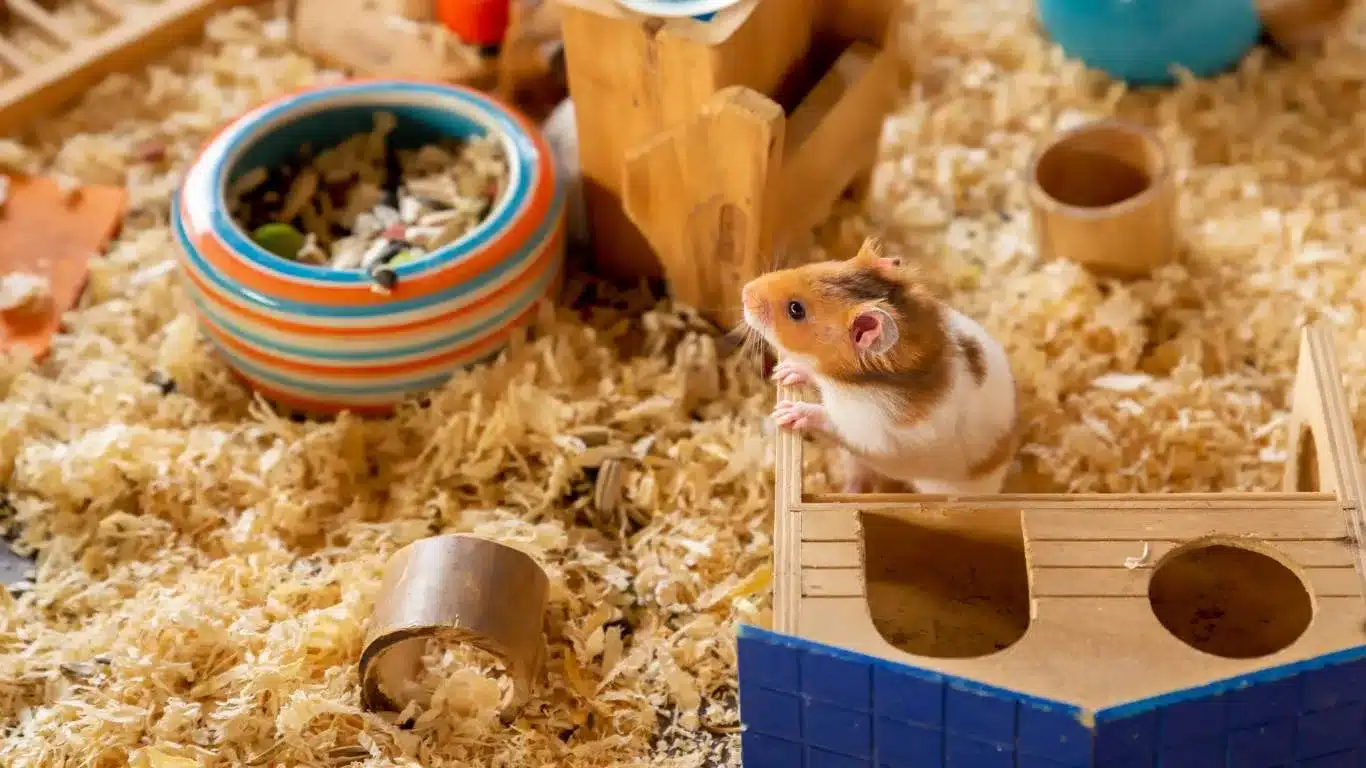
Habitat for Syrian Hamsters
Choosing the right enclosure for your Syrian hamster is crucial to create a comfortable and safe habitat. Metal or wire-based habitats are preferable as they provide good ventilation for your pet’s well-being. However, it is essential to avoid glass and plastic enclosures as they can trap ammonia and fumes, leading to respiratory issues for your hamster.
For an ideal Syrian hamster habitat, the size should be a minimum of 24″L x 12″W x 16″H. This spacious cage allows your hamster to roam and explore. Additionally, the habitat should have a deep, solid base to provide ample substrate for burrowing and tunneling, which are natural behaviors for Syrian hamsters.
To ensure your hamster’s security, the cage should be escape-proof with securely latched doors or lids. It is also vital that the enclosure is well-ventilated to maintain adequate air circulation. Proper ventilation helps to prevent the buildup of odors and keep a fresh environment for your furry friend.
Creating an enriched habitat for your Syrian hamster not only promotes physical health but also mental stimulation. Add platforms, tunnels, hides, and exercise wheels to keep your hamster active and entertained. Providing diversions such as chew toys and tunnels also helps to satisfy their natural instincts.
Remember to regularly clean and maintain your hamster’s habitat to ensure a hygienic living space. Remove any soiled bedding, wipe down surfaces, and replenish fresh substrate. A clean and comfortable habitat is essential for your Syrian hamster’s overall well-being.
Join the Pet Planet Diaries
Sign up for our newsletter to get the latest tips, stories, and exclusive insights into the wonderful world of pets.
Benefits of a Proper Habitat:
- Allows for natural behaviors like burrowing and tunneling
- Provides good ventilation for a fresh environment
- Helps prevent respiratory issues by avoiding ammonia and fume buildup
- Supports physical health and mental stimulation through the addition of enrichment items
- Ensures a clean and hygienic living space for your hamster
| Pros | Cons |
|---|---|
| Good ventilation | Ammonia and fume trap in glass/plastic enclosures |
| Spacious for exploration | Requires proper cleaning and maintenance |
| Secure and escape-proof | Regular substrate replenishment needed |
| Allows for mental and physical stimulation |
Recommended Products for Syrian Hamsters
To keep your Syrian hamster happy and healthy, it is important to have the right supplies on hand. Here are some essential items that will ensure your hamster’s well-being:
1. Habitat:
An appropriately sized habitat is crucial for your hamster’s comfort. Choose a cage that meets the minimum size requirements of 24″L x 12″W x 16″H to provide enough space for your pet to explore and exercise.
2. Food and Treats:
Provide your hamster with high-quality hamster food that is specifically formulated for their nutritional needs. Additionally, offer small treats occasionally to add variety to their diet and keep them engaged.
3. Bedding and Nesting Fluff:
Select safe and comfortable bedding for your hamster’s habitat. Wood shavings or paper-based bedding are good options. Also, provide nesting fluff to allow your hamster to create a cozy sleeping area.
4. Food Bowl and Water Bottle:
Ensure your hamster always has access to fresh water by providing a water bottle or a shallow bowl. Use a food bowl to offer their daily meals, keeping it clean and replenished regularly.
5. Exercise Wheel and Ball:
Hamsters are active creatures that require plenty of exercise. Installing an exercise wheel in their habitat will allow them to run and burn off excess energy. An exercise ball is also a great way to let your hamster explore outside of their cage in a safe environment.
6. Hideaway Place and Toys:
Provide your hamster with a hideaway place where they can retreat and feel secure. This can be a small house or tunnel. Additionally, offer a variety of toys to keep your hamster mentally stimulated, such as tunnels, tunnels, chew toys, and puzzle toys.
7. Wood Chews and Mineral Chews:
Hamsters have constantly growing teeth, so it’s important to provide them with suitable chew toys to keep their teeth in check. Wood chews and mineral chews are excellent options to satisfy their natural chewing instincts.
8. Chew Tubes and Dust Bath:
Chew tubes provide additional places for your hamster to explore and hide, stimulating their natural behaviors. A dust bath can help keep your hamster’s fur clean and free from oils. Use chinchilla sand or dust specifically made for hamsters.
9. Small Animal Playpen:
A small animal playpen allows your hamster to have supervised playtime outside of their cage. It provides a controlled space where your hamster can roam, socialize, and explore safely.

With the right supplies, you can create a comfortable and engaging environment for your Syrian hamster. Remember to monitor their supplies regularly and replace or replenish them as needed.
| Supplies | Description |
|---|---|
| Habitat | An appropriately sized cage or enclosure |
| Food | High-quality hamster food and occasional treats |
| Bedding | Safe and comfortable bedding materials |
| Water Bottle | A bottle to provide fresh water |
| Exercise Wheel | A wheel for physical exercise |
| Hideaway Place | A cozy spot for resting |
| Toys | Various toys for mental stimulation |
| Wood Chews | Chew toys to maintain dental health |
| Mineral Chews | Chews containing essential minerals |
| Chew Tubes | Additional hiding places for exploration |
| Dust Bath | A bath for fur cleanliness |
| Small Animal Playpen | A controlled space for supervised playtime |
Setting Up Your Habitat
When it comes to creating a comfortable and stimulating environment for your Syrian hamster, proper habitat setup is crucial. Creating a space that mimics their natural habitat will help keep them happy and healthy. Here are some essential tips to consider:
Location and Environment
- Choose a quiet area: Place your hamster’s habitat in a quiet, low-traffic area of your home. This will minimize stress and disturbances for your furry friend.
- Avoid direct sunlight: Keep the habitat away from direct sunlight or any sources of extreme heat or cold. Hamsters are sensitive to changes in temperature, and direct sunlight can be harmful to their health.
- Draft-free environment: Ensure that the habitat is located in a draft-free area. Drafts can cause respiratory problems for hamsters, so it’s important to keep them in a well-ventilated space without any cold or hot air currents.
Solo Living
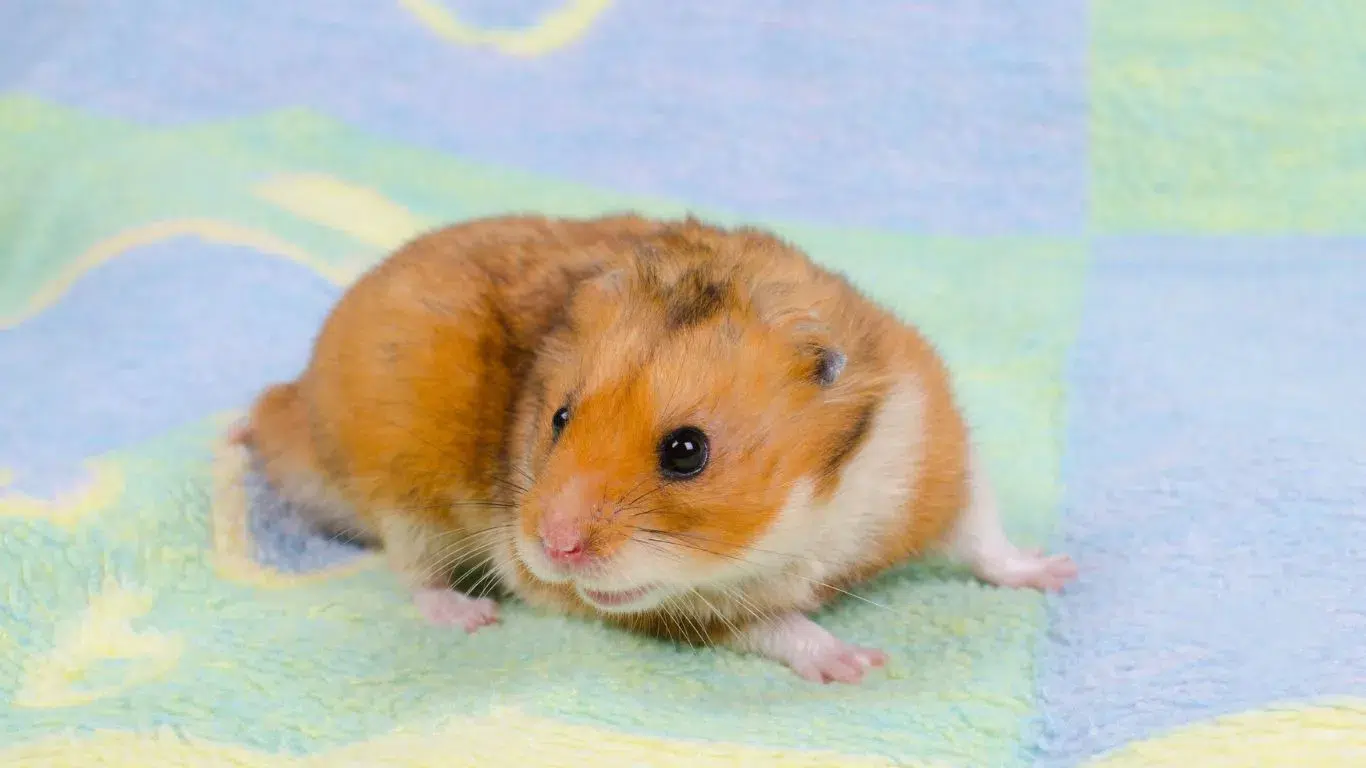
Syrian hamsters are solitary creatures and prefer to live alone. They are territorial animals and may become aggressive or stressed if housed with other hamsters. It’s best to provide a separate habitat for each adult hamster to ensure their well-being.
Bedding and Accessories
- Comfortable bedding: Choose a suitable bedding material that provides comfort for your hamster. Avoid cedar and pine bedding as they can be harmful to their respiratory system. Aspen or paper-based bedding are safer options.
- Hideout boxes: Hamsters love having a cozy place to hide and sleep. Provide hideout boxes or tunnels where they can retreat and feel secure.
- Running wheels: Access to a running wheel is essential for a hamster’s exercise and mental stimulation. Make sure the wheel is the right size for your Syrian hamster to prevent any injuries.
Creating a hamster-friendly environment will make your little companion feel safe and happy. Remember to monitor the habitat regularly to ensure cleanliness and make any necessary adjustments for your hamster’s well-being.
Next, we’ll dive into the dietary needs and nutrition requirements for your Syrian hamster. But before that, take a look at this adorable Syrian hamster in a well-designed habitat:
Diet and Nutrition for Syrian Hamsters
Syrian hamsters, being omnivores, require a well-balanced diet to thrive. The key to their nutritional needs lies in providing them with high-quality hamster lab blocks or pelleted food. These specially formulated food products contain essential nutrients that support your hamster’s overall health and well-being.
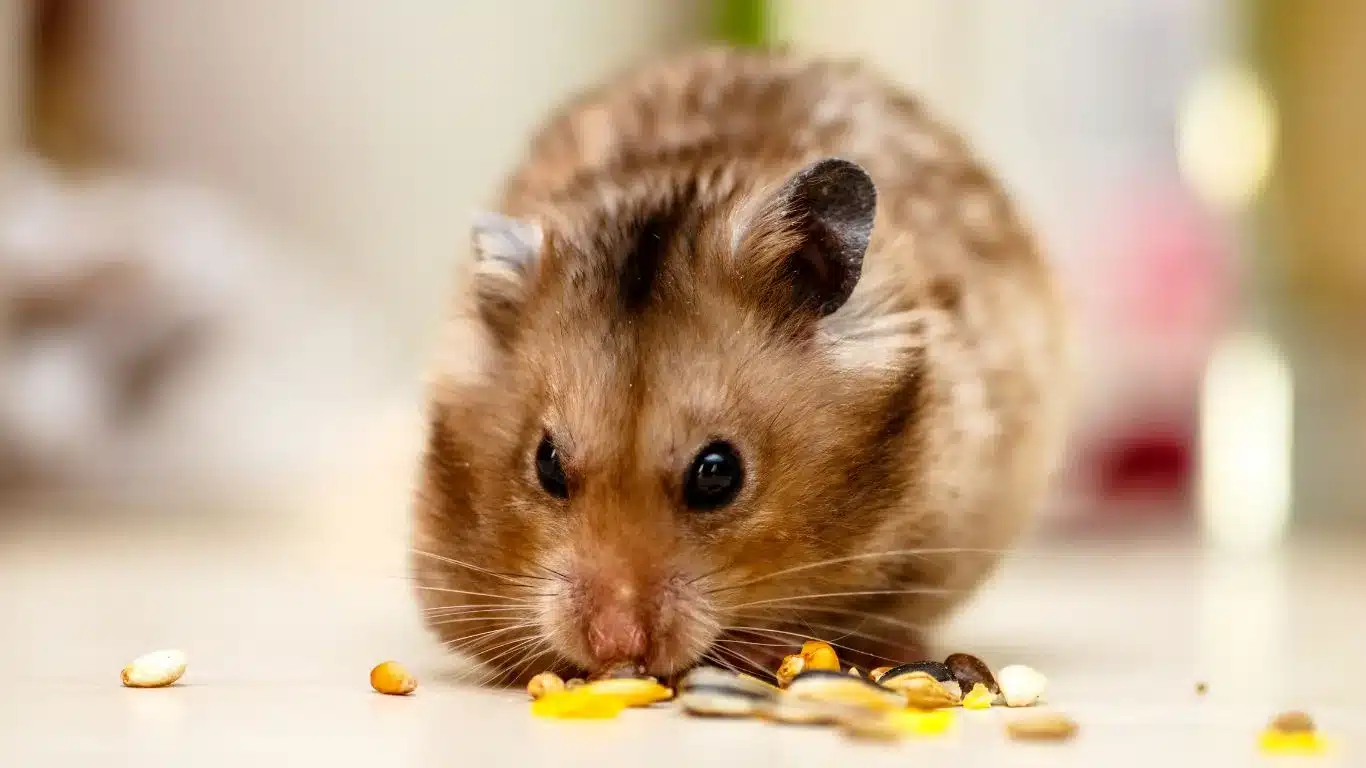
While lab blocks or pelleted food are the primary source of nutrition for your hamster, you can also supplement their diet with small amounts of other foods. Including a variety of grains, vegetables, fruits, and hay in their diet can provide additional nutrients and enhance their eating experience. However, it’s important to introduce new foods gradually and monitor your hamster’s reaction to ensure they tolerate them well.
When offering fresh produce, make sure to wash them thoroughly and cut them into small, bite-sized pieces. This makes it easier for your hamster to eat and reduces the risk of choking or digestive problems. Some safe and nutritious options for your hamster include:
- Leafy greens: spinach, kale, romaine lettuce
- Vegetables: carrots, bell peppers, cucumbers, zucchini
- Fruits: apples, bananas, berries, melons (in moderation)
It’s essential to provide fresh, clean water for your hamster at all times. This can be done by offering water through a shallow bowl or a water bottle attached to the side of the cage. Regularly check and change the water to ensure it stays clean and free from contamination.
Avoid feeding your hamster certain foods that can be harmful to their health. These include chocolate, caffeine, alcohol, sugary treats, and high-fat foods. These items can cause digestive upset, obesity, and other health issues in hamsters.
Understanding your hamster’s dietary needs is crucial in providing them with a healthy and balanced diet. By focusing on high-quality lab blocks or pelleted food as the main staple and incorporating small amounts of appropriate fresh foods, you can ensure your hamster receives the necessary nutrients for a long and happy life.
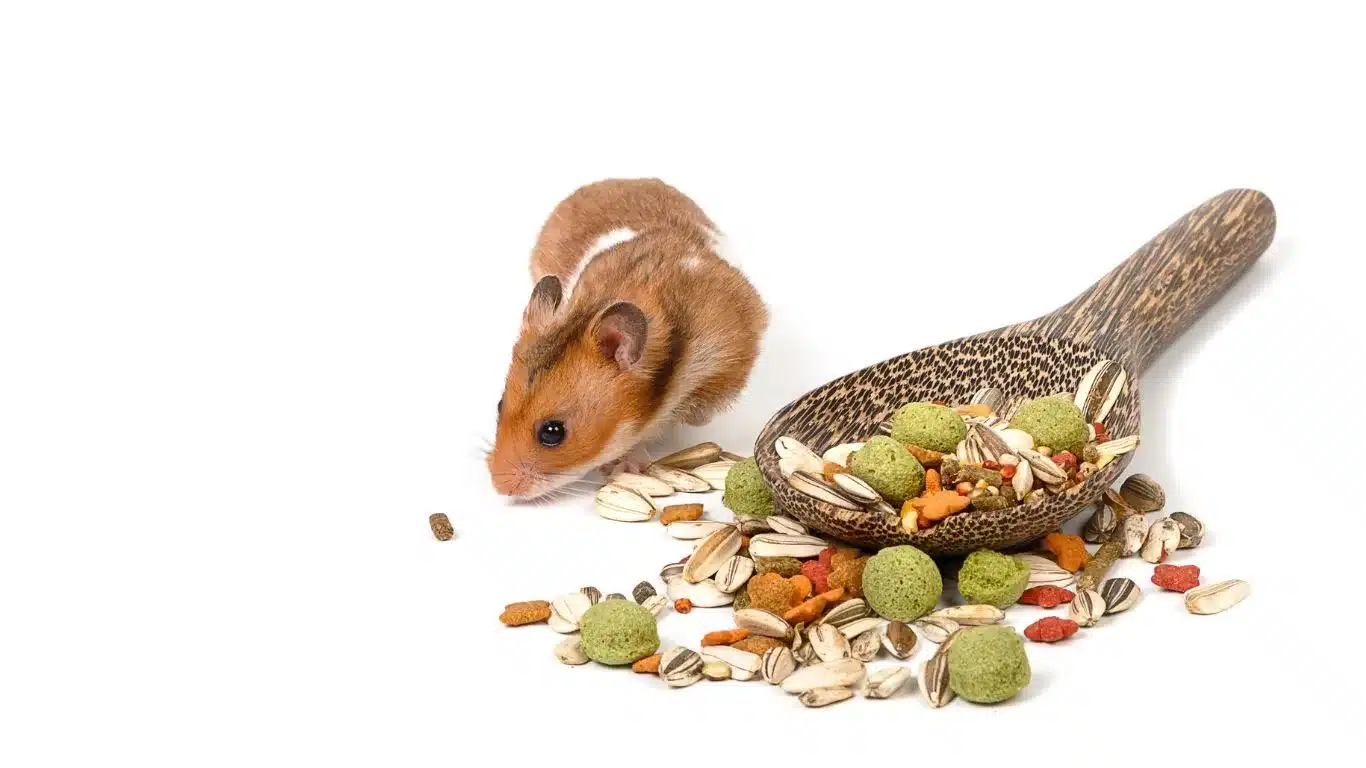
Recommended Hamster Lab Blocks and Pelleted Food Brands:
| Brand | Description |
|---|---|
| Kaytee Forti-Diet Pro Health Hamster Food | A nutritionally complete food fortified with essential vitamins and minerals, promoting optimal health for Syrian hamsters. |
| Oxbow Essentials Hamster and Gerbil Food | Formulated with a blend of high-fiber ingredients, Oxbow Essentials supports digestive health and provides balanced nutrition for hamsters. |
| Mazuri Rat & Mouse Food | This lab block food is appropriate for hamsters as well, offering a balanced diet with optimal levels of protein, fat, and fiber. |
Grooming and Care for Syrian Hamsters
Syrian hamsters are excellent self-groomers, but sometimes they may need a little help if they get dirt or debris stuck in their fur. Keeping your hamster clean is essential for their overall health and well-being. Regularly cleaning their habitat and addressing common health issues will ensure that your hamster remains happy and healthy.
To keep your hamster’s living space clean, spot-clean the bedding regularly and change it as needed. This helps prevent odors and maintains a hygienic environment for your furry friend. Additionally, make sure to take the time to inspect your hamster’s fur and paws during routine cage cleanings.
“Keeping your hamster’s living space clean is vital for their overall health and well-being. Regular spot-cleaning of the bedding and attentive grooming will ensure a hygienic environment for your furry friend.”
Hamsters can be prone to certain health issues, including wet tail, which is a gastrointestinal infection that can be caused by stress, poor hygiene, or a change in diet. Look out for signs of wet tail, such as diarrhea, lethargy, and a wet appearance around the tail area. If you notice any of these symptoms, it’s important to consult a veterinarian immediately for diagnosis and treatment.
Another common health concern for hamsters is overgrown teeth. Hamsters’ teeth continuously grow throughout their lives, and if they don’t have proper chewing material, their teeth may become too long and cause pain or difficulty in eating. Provide your hamster with appropriate chew toys made of safe materials to help keep their teeth properly worn down.
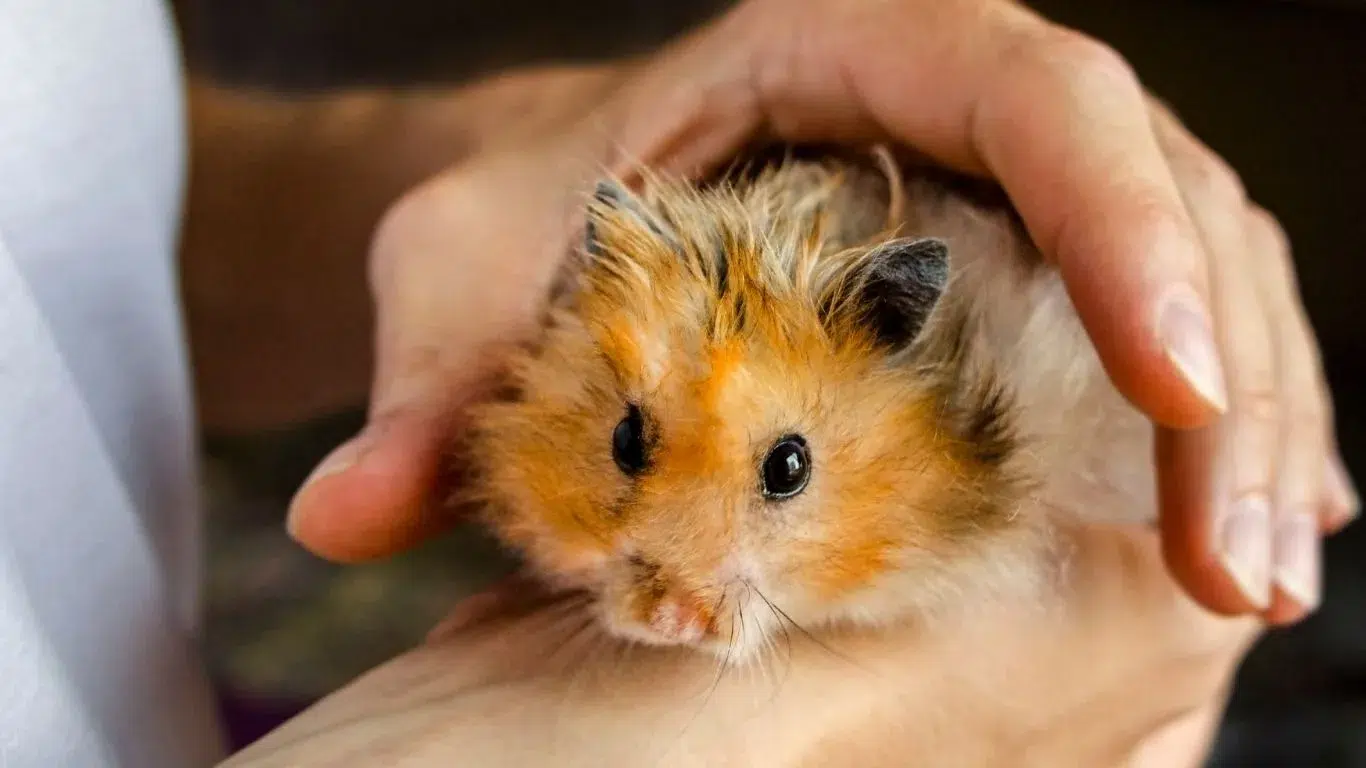
Hamster Grooming Tips:
- Check your hamster’s fur and paws regularly for any signs of dirt, debris, or matting.
- Use a soft, clean cloth or small brush to gently remove any dirt or debris from your hamster’s fur.
- Do not use water to clean your hamster unless instructed by a veterinarian.
- If your hamster has a sticky substance in their fur, you can use a small amount of pet-safe unscented baby wipes to gently clean the affected area.
- Trim your hamster’s nails carefully when necessary, being cautious not to cut into the quick.
Regular grooming and attentive care are essential for the health and well-being of your Syrian hamster. By keeping their living space clean and addressing any health issues promptly, you can ensure that your hamster remains happy and healthy throughout their life.
Hand-Taming and Training Your Hamster
Building a strong bond with your Syrian hamster starts with regular handling. By taking the time to handle your hamster gently and patiently, you can help them become more comfortable with being held and trained. Here are some tips to guide you:
- Introducing your hand: To begin the taming process, slowly and calmly introduce your hand into the hamster’s cage. Allow them to sniff and investigate your hand at their own pace. Patience is key here, as it may take some time for your hamster to become accustomed to your presence.
- Waiting for adjustment: Once your hamster seems comfortable with your hand in the cage, wait for them to adjust before attempting to pick them up. This ensures that they are not startled or fearful during the handling process.
- Gentle and careful handling: When picking up your hamster, approach them from the side and scoop them up gently, supporting their body with cupped hands. Avoid squeezing them too tightly or grabbing them by their tail, as this can cause them distress and potentially harm them.
Consistency is key when it comes to taming and training your hamster. Make sure to handle them regularly, even if it’s just for a short period each day. This helps them become accustomed to your touch and builds trust between you and your furry friend.
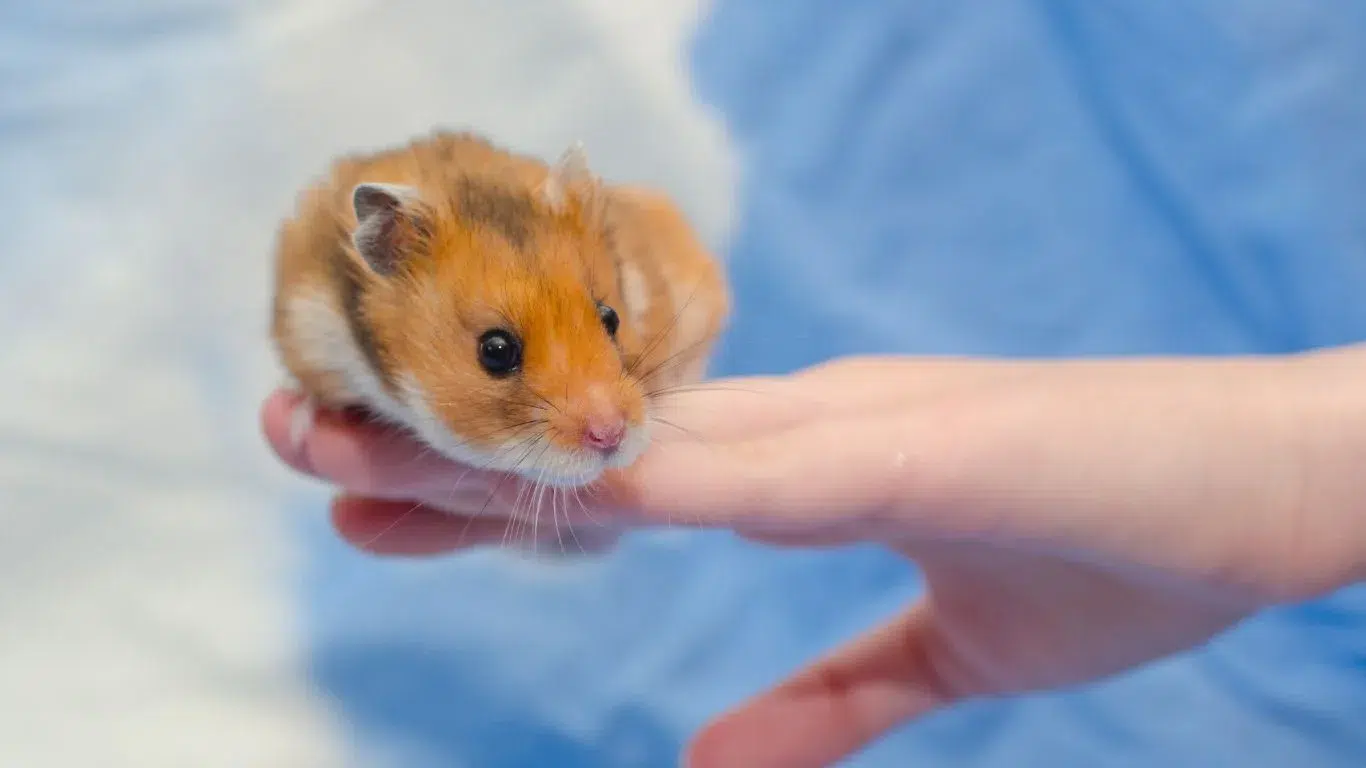
With time, patience, and positive reinforcement, you can train your hamster to respond to simple commands and engage in interactive activities. Remember to always reward good behavior with treats and praise, and never force your hamster to do something they are uncomfortable with.
Proper handling and taming techniques are essential to ensure a happy and well-adjusted hamster. By taking the time to build trust and create positive associations with handling, you can establish a strong bond with your furry companion.
Hamster Training Tips
If you’re interested in training your hamster to perform tricks or engage in fun activities, here are some tips to get you started:
- Start with basic commands: Begin by teaching your hamster simple commands, such as coming to your hand or going through a tunnel. Use positive reinforcement, such as treats or verbal praise, to encourage and reward desired behaviors.
- Use clicker training: Clicker training can be an effective method for teaching your hamster more complex tricks. By associating a clicker sound with a reward, you can communicate specific behaviors you want your hamster to perform.
- Be patient and consistent: Remember that training takes time and patience. Break down the desired behavior into small steps and work on one command at a time. Consistency is key, so make sure to practice regularly.
By incorporating training into your hamster’s routine, you can provide mental stimulation and enrichment, enhancing their overall well-being and strengthening the bond between you and your adorable pet.
Where to Get a Syrian Hamster
If you’re considering adding a Syrian hamster to your family, you might be wondering where to find one. While pet shops may be a convenient option, it is highly recommended to explore alternative sources such as reputable breeders or rescue organizations. These options provide several advantages, ensuring you bring home a healthier and well-cared-for hamster.
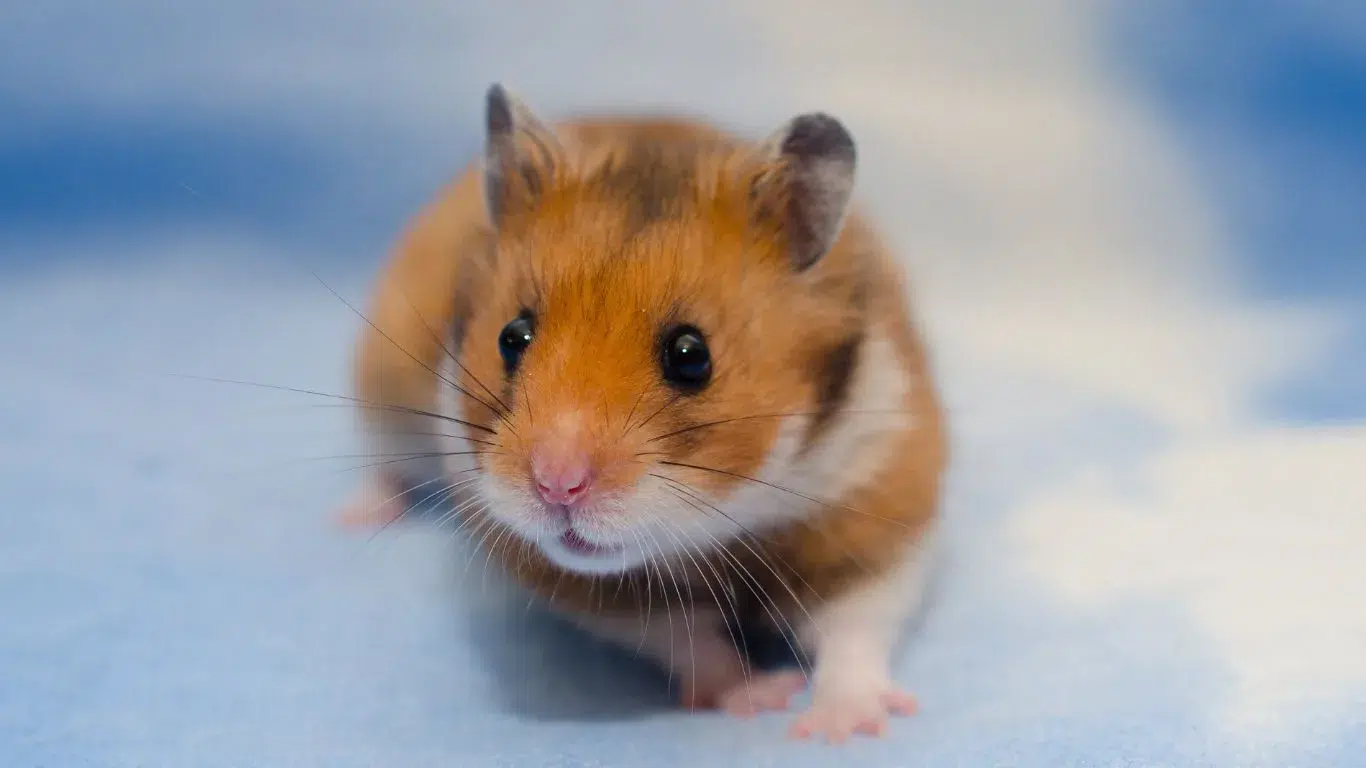
A reputable breeder specializes in breeding and raising hamsters, focusing on the well-being and genetic health of the animals. They can provide valuable information about the hamster’s lineage, personality traits, and any potential health concerns to consider. Additionally, breeders often prioritize socialization, resulting in hamsters that are more accustomed to human interaction.
Rescue organizations are another fantastic option for acquiring a Syrian hamster. These organizations rescue and rehome hamsters in need, offering them a second chance at a loving home. Adopting from a rescue not only provides a home for a deserving hamster but also supports the efforts of these organizations to save more animals.
When obtaining a hamster, whether from a breeder or a rescue organization, it’s important to evaluate their health and well-being. Look for a hamster that appears active, alert, and free from any signs of illness or injury. A healthy hamster should have bright, clear eyes, a clean and well-groomed coat, and a good appetite.
Before bringing a hamster into your home, it’s essential to consider the responsibilities and costs associated with owning a pet. Hammies require a suitable habitat, regular veterinary care, and a proper diet. It’s important to provide them with daily enrichment and give them the time and attention they need to thrive. By understanding and being prepared for these responsibilities, you can ensure a happy and fulfilling life for your new furry friend.
Join the Pet Planet Diaries
Sign up for our newsletter to get the latest tips, stories, and exclusive insights into the wonderful world of pets.
Final Remarks
Syrian hamsters are wonderful pets that can bring immense joy and happiness to families. By following the tips and guidelines provided in this care guide, you can ensure that your Syrian hamster is well-cared for and lives a healthy, fulfilling life.
Syrian hamster care involves providing proper handling, which includes gentle and careful interaction to build trust and a strong bond with your pet. An appropriate and suitable habitat is essential, ensuring that it is the right size and well-ventilated. A nutritious diet consisting of high-quality hamster food, supplemented with grains, vegetables, and fruits, will keep your hamster healthy and satisfied.
Grooming and regular health care are crucial aspects of Syrian hamster care. Regularly cleaning and maintaining the habitat by spot-cleaning the bedding and changing it regularly will keep the environment hygienic. Pay attention to your hamster’s grooming needs, helping them if they get debris or dirt stuck in their fur. Having a trusted veterinarian and being aware of potential health issues, such as wet tail and overgrown teeth, will ensure prompt treatment and preventive care.
Lastly, your Syrian hamster craves your love, attention, and interaction. Spend quality time with your pet, provide stimulating toys and activities, and create a safe and secure environment. With the right care and commitment, your Syrian hamster will thrive and become a beloved member of your family.
FAQ
How do I properly socialize my Syrian hamster?
Proper socialization involves holding your hamster gently over a soft surface, avoiding squeezing or grabbing their tails. Allow them time to adjust to their surroundings and use their senses of smell and touch to explore. You can also train them to use a litter box.
What is the lifespan of a Syrian hamster?
Syrian hamsters have a lifespan of 2-3 years with proper care and attention.
How big should a Syrian hamster habitat be?
The minimum recommended habitat size for a Syrian hamster is 24″L x 12″W x 16″H.
What type of enclosure is best for a Syrian hamster?
Metal/wire-based enclosures offer good ventilation, while glass and plastic enclosures should be avoided as they can trap ammonia and fumes. The cage should be escape-proof and well-ventilated.
What are the essential supplies I need for a Syrian hamster?
Essential supplies include an appropriately sized habitat, high-quality hamster food, treats, bedding, nesting fluff, food bowl/water bottle, exercise wheel, exercise ball, hideaway place, toys, wood chews, mineral chews, chew tubes, dust bath, and a small animal playpen.
Where should I place my Syrian hamster’s habitat?
The habitat should be placed in a quiet, draft-free area away from direct sunlight.
What should I feed my Syrian hamster?
Syrian hamsters are omnivores and should be fed a high-quality hamster lab blocks or pelleted food. They can also be given small amounts of grains, vegetables, fruits, hay, and treats. Fresh, clean water should always be available.
How do I groom my Syrian hamster?
Syrian hamsters groom themselves, but they may need assistance if they get dirt or debris stuck in their fur. Regular cleaning of the habitat is necessary, including spot-cleaning the bedding and regularly changing it.
How do I tame and train my Syrian hamster?
Taming and training your hamster involves patience and consistent handling. Introduce your hand into the cage and wait for the hamster to adjust before attempting to pick them up. Handling should be done gently and with care to avoid startling or dropping the hamster.
Where can I get a Syrian hamster?
Syrian hamsters can be purchased from pet shops, but it is recommended to seek reputable breeders or rescue organizations for healthier and well-cared-for hamsters.







